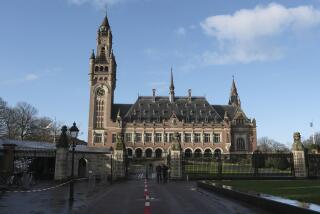World Court’s Caution Signal
- Share via
The World Court has unanimously concluded that the United States must submit to international arbitration its proposal to close the Palestine Liberation Organization office in New York. The decision is correct, affirming the treaty obligations that the United States undertook when it invited the United Nations to build its headquarters in New York City.
Congress has, as we have said before, exceeded its authority as well as good sense in waging this campaign to try to drive the PLO out of the United States by legislating the closure of offices both in Washington and New York. The Reagan Administration wisely resisted, but Congress prevailed by attaching the mandate to an appropriations bill that the President could not veto.
The PLO is being attacked by Congress as a terrorist organization. There is no question that elements of the PLO continue to resort to violence in their campaign against Israel and in their efforts to establish a Palestinian state. But the PLO offices in the United States have not been linked to violent actions. It cannot be ignored, furthermore, that the PLO remains the dominant voice of the Palestinian people, moderates as well as extremists, a voice that cannot be stilled by force, as Israel has found, or by legislative mandate, as Congress is discovering. Nor should it be stilled.
The State Department characterized the World Court decision as “premature,” noting that the matter already is in the courts of the United States. A more appropriate answer would have been to welcome the judgment of the World Court, which, essentially, upheld what the State Department has been arguing all along, that this is an international issue not subject to domestic law.
It is for the United Nations to judge which organizations have a right to maintain offices to represent them in New York at U.N. headquarters. The American treaty obligation is unambiguous.
This American Administration, more than any other, has been reluctant to recognize the importance of strengthening the World Court. The usefulness of the court has been demonstrated many times, including its decisions resolving a border dispute between Canada and the United States and in supporting U.S. efforts to free its hostages in Iran in 1980. But the U.S. Administration, angered when the court moved to rule against U.S. military action against Nicaragua, terminated its automatic compliance with the court in 1985 and challenged the jurisdiction of the court. That served only to weaken the process of constructing, bit by bit, a system of legal order and a rule of law in a turbulent world.
More to Read
Sign up for Essential California
The most important California stories and recommendations in your inbox every morning.
You may occasionally receive promotional content from the Los Angeles Times.












